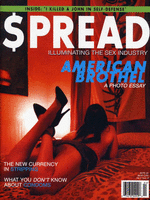History
Articles were written by readers as well as by figures from academic, cultural, and literary backgrounds, most of whom were current or former sex workers. The magazine was launched on March 15, 2005 by Rachel Aimee, Rebecca Lynn, and Raven Strega. [1] $pread was based in New York City, and was sold throughout the United States and Canada at independent bookstores and via national distributors. [3]
A co-editor said, "We want the general public to become aware of issues such as the physical working conditions of sex workers and their health care and housing needs, and to start considering sex workers as real people rather than mythical beasts who only come to life when someone drops a quarter into a slot." [4]
$pread published personal experiences, political insights, and contained practical information, such as news, features, health columns, and sex industry resources. $pread supported the sex work community by donating 15% of each print run to the workplaces of and the outreach organizations utilized by sex workers. The tax outreach program "helps sex workers who don't know they can and should file taxes", said Audacia Ray, an executive editor at the magazine. [5]
As of August 30, 2010, $pread ceased printed publication due to both financial issues and not having enough people to keep the operation running, even if "there was $100k made available". [6]
This page is based on this
Wikipedia article Text is available under the
CC BY-SA 4.0 license; additional terms may apply.
Images, videos and audio are available under their respective licenses.
